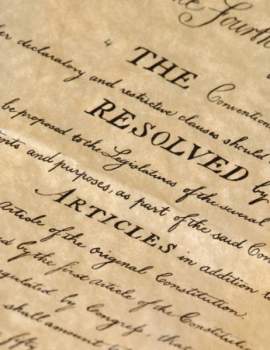
Lack of Executive Power, Right of Taxation, and Judicial Body

Popular In Constitution
Purpose Of Lifetime Appointment And Pros And Cons Enumerated Powers Bicameral Legislature Background Article 3 Of The Constitution We The People 1st Amendment Who Wrote The Constitution Judicial Review Equal Protection Clause Three Fifths Compromise 10th Amendment 5th Amendment
The goal of the Articles of Confederation was not an ambiguous one; the appointed authors of the Articles of Confederation were determined to prevent even the slightest chance of a monarchical presence. As a result, they opted to strip the centralized government of any power and leverage over any of the individual sovereign states. Though the newly-appointed centralized government retained the ability to create and maintain a military and postal service, manage foreign affairs, declare war, establish peace treaties, and coin money, their power was halted in any and all issues involving the 13 states.
Though the Articles of Confederation allowed the central government to request taxes and payments from the states, these requests could only be proposed in the form of a donation - there no longer existed a right of taxation. As a result, the few aspects of control and power that the central government did retain, like the formation of a military and postal service, were contingent on donations from the individual states. Should any State refuse payment, the central government had no legal authority to penalize them for withholding funding. In addition, the little power that the central government did have was stifled by its inability to enforce the upholding of laws due to the lack of any acting judicial body. For instance, there existed neither an appointed President to maintain the law, nor a judicial body to uphold the integrity of the law.
As a result of the Articles of Confederation, the only branch of Government that existed was the legislative branch, but even its power was flawed. Though the legislative branch of the central government could institute laws, it was powerless to enforce them should a State (or states) refuse to embrace a law passed by the central government.
Because the Articles of Confederation disallowed the central government to enforce the collection of taxes, it found itself in financial crisis. The central government had soon discovered that it was unable to not only manage the few allowances of power that it was granted by the Articles of Confederation, but also unable to maintain them without proper funding. Without a right to taxation, the central government became destitute; both the postal service, as well as the military, were on the brink of dissolution.
Though the central government still retained the ability to coin money, the paper notes that they were printing were not backed by any hard currency. Because the nation needed a both a postal service as well as a military, the central government was forced to fund both organizations with worthless money, and as a result, created the devaluation of all currency in circulation.
The Articles of Confederation stated that a law would only be passed in the event that 9 out of the 13 states agreed upon its validity. As a result, the creation of new laws became difficult. In addition, due to the sovereignty of the states, the establishment of a national foreign policy was an impossibility. Foreign countries that wished to trade with the United States of America were subject to 13 individual trade regulations.
Although the authors of the Articles of Confederation sought out to spare the collective citizens of any possibility of the return of a totalitarian rule, the elimination of any control that the central government could exercise in its dealing with the individual states proved to be antithetical to the establishment of any national policy.
NEXT: Articles of Confederation and Its Inherent Weakness





















